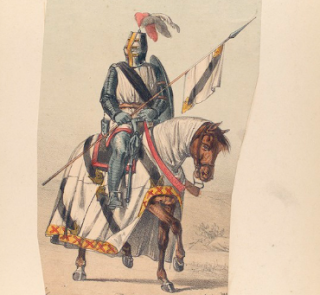 |
| public domain image via NYPL and Wikimedia Commons |
The playroom floor lay covered in toys. By the corner next to a bookshelf, a boy lay in a bare spot and listened his father read parables from an illustrated book. After the second story, he asked to see the book. After the third one, a story about knights and chivalry, he turned the pages. By the fourth, he read to his father.
After he finished reading, he asked, "Do things really work like in the stories?"
"No, not really."
"Then why do we read them?" He closed the book with a frown. He re-opened it to gaze at one of the elaborate pictures of a knight on a horse.
His father rose. Hands on hips, he surveyed the room. He picked up one of toys and waved it, an indication that he wanted to find where it belonged. The boy pointed to a wooden chest. His father tossed the toy in.
"Stories give us direction," he said. He nodded to himself. A moment later, he picked up another toy and inspected it. "Yes, that's the reason."
The boy's mother poked her head into the room. She smiled as she noticed them cleaning. With a grunt, she leaned over to grab a plastic golf club and a dull, toy sword.
"Stories were around before cities, honey," she told the boy. "They were there at the start of humanity. They're how people perceive. Or really, it's how they make sense of what they perceive."
"Remember those pictures we showed you of the cave walls?" his father added. "They had stories drawn on them, didn't they? You told us what they were about."
"Yeah." The boy stood. He shut the book and turned to the shelf to put it back.
"Without stories in our heads," said his mother, "we would have no sense of causality. That's, uh, how one thing leads to another. That's the basis of our narrative structure, cause and effect."
"Stories can be misleading," said his father. "Even when they don't mean to be. And they can mean to mislead, too. So they're not so great."
"What?" His mother gave a smiling sort of scowl. She dropped the golf club into its bagged set. "How does daddy figure? Daddy, what do you mean by that?"
"It's like ... when I was younger and I didn't want children." He hesitated. His wife's and his son's eyes widened. "My mother experienced two late-term miscarriages and a stillbirth before me. I told myself that I was the diseased child of a problem family. Later, when I wanted children, the same facts became a different story. In my mind, I became the first child who lived. I was the survivor. In fact, I could survive anything. My children would, too."
"I never heard about this before," his mother growled. She picked up a box of crayons.
"But which story is true?" the boy asked.
"It's the same facts," his father replied. "Both stories are true. The same circumstances lead to different stories depending who you ask. Do you know what a self-fulfilling prophecy is?"
"No."
"Uh-oh. Mommy does." She leaned on the sword for a moment. But it wobbled. She straightened up. "It's like when she was a little girl and told herself she couldn't draw. So she didn't. And that's how it came true. Don't do that, by the way. Keep drawing."
She passed her boy the crayon set and gestured for him to put them in his open desk drawer.
"That's a good example," said his father. "You have to be careful with the stories you make for yourself. If you tell stories about your inevitable failure, you give up trying. And if you tell yourself about your coming success, you succeed. The setbacks along the way don't bother you. Other people would give up. But not you. Because you know how your story goes and eventually, you succeed."
"So if it's a good story does that make it right?"
"I'm not sure. Sometimes the stories you tell about yourself reveal who you are. But sometimes they determine it, too."
The boy rubbed his chin, the way his father did when he thought. He found a hollow golf ball and dropped it into the golf set. His mother hadn't moved in a while. She kept rubbing her tummy while his father worked.
"If you give me some little brothers like Sir Gawain the knight," the boy said to both parents, "I'll take care of them forever and ever."
His mother took half a step towards him. She poked him gently with the sword.
"Little sisters, too?"
"Of course!"
She patted her belly. "I like that story."
Really liked this. I believe that this is one of the fundamental lessons of life. Everything is based upon your perception of it whether or not that perception is true or not. This belief shapes how you view things and becomes your personal truth. This truth can be challenged and should be challenged by other's views, the environment, religion and knowledge. Your personal truths are always evolving and changing as you learn and grow but they should remain yours.
ReplyDeleteAgreed, our perceptions go a long way to determining our actions. Our actions in turn form the basis of our shared experiences - how we learn. So inner narrative, the lens through which we perceive so much, gives our lives direction.
ReplyDeleteOf course, the strong effects of our inner narratives are the reasons people spend time in certain types of meditation trying to eliminate such stories. Mindfulness is a useful tool for getting past narrative into the essential nature of things.